In Focus
Manijeh Saba fell ill during court proceeding: Her trial continues on March 27
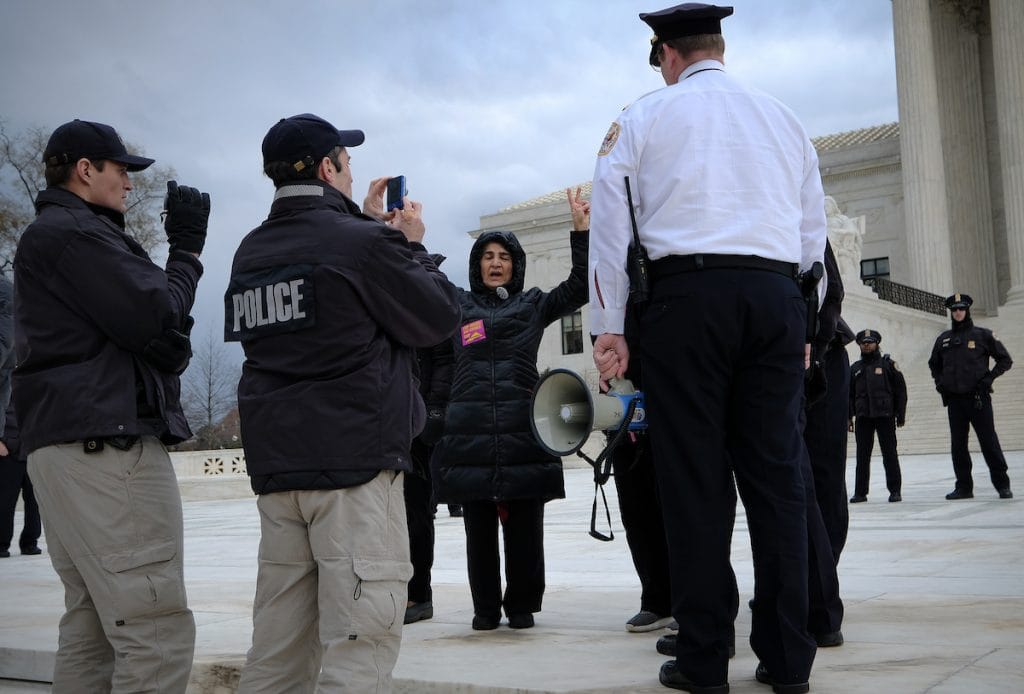
Manijeh Saba’s trial in U.S. District Court for the charge of protesting on the steps of the Supreme Court began on Wednesday March 6th. On January 9, she and four others were calling out the U.S. government’s complicity in war atrocities against the people of Yemen as well as its ongoing torture of Muslim men at Guantanamo Prison. They were arrested on January 9, but charges were dropped against three others and Joanne Lingle pleaded guilty.
Early in Wednesday’s proceedings Manijeh fainted, and Judge Deborah A. Robinson scheduled a continuation of the trial on March 27 at 10:30 in Courtroom 4 of the Prettyman U.S. District Courthouse, 333 Constitution Avenue NW, 2nd floor. Please come for support, if you can!
After trial preliminaries Manijeh presented her opening statement. As she spoke, she needed to pause as she became overcome with emotion and also began to feel faint. Judge Robinson asked if she would like to sit down, but she insisted on completing her statement:
Good Morning your Honor, I’m Manijeh Saba.
Read to the court on March 6, 2019.
Today, you will hear that I allegedly violated a law by protesting. I intend to show you that my actions were not illegal, that they were an exercise of my First Amendment Rights. I will ask you, at the end of this trial, to find me not guilty, because my conduct is protected by the First Amendment of our Constitution.
I am a 72 years old Iranian-American mother, grandmother of three, and married to Majid Maleki for 46 years. I came to the United States in 1977 for graduate studies. I am a political sociologist with focus on women and development.
I was born in Iran, in a military household during a short-lived, decade of burgeoning democracy whose life was cut short, thanks to the US-British coup d’état of 1953. Hence, I have experienced two authoritarian regimes in Iran, one that of the Shah, and the other the continuing brutal theocracy of the Islamic Republic. As a result, I know what it means to live under a dictatorial regime.
As I remember, I have always been curious, asked questions, and pushed against unreasonable boundaries. Therefore, resistance against totalitarianism, regardless of where it exists, and however it rears its vicious head, is a fundamental part of who I am.
I became a US citizen in 1996 and have voted in every election since then. As part of the citizenship process, I took the oath to “support and defend the Constitution and the laws of the United States of America against all enemies, foreign and domestic”. I have great respect for our constitution and carry a copy with me at all times. I took the pledge of nonviolent resistance and have tried to follow the path of Mahatma Gandhi and Dr. Martin Luther King who, in the face of violence, gave their lives in promotion of peace and justice.
It is this background that has brought me before you today.
On January 6th of this year, the 17th anniversary of the opening of Guantanamo prison, I joined Witness Against Torture for a week in Washington DC to fast, remember, and raise awareness about the 9 Muslim men who died in Guantanamo, and the condition of the 40 remaining in the extrajudicial trap of indefinite detention each for at least 10 years. Of the 40 Muslim men still detained there, 5 have been cleared for release, as not a threat to security. The US Federal courts have determined that 32 others are detained unlawfully. How could this happen in the United States? I could neither forget nor stand by, when innocent people including the hundreds who have already been released without charge from Guantanamo are targeted and tortured with no end in sight.
Also, we spent the week remembering the horrific condition of the people of Yemen due to the US backed Saudi led coalition war since March 2015. This war is being fought with the support of United States Intelligence as well sale of bombs made in the United States. This forgotten war on Yemen has so far killed 146, 000 people, at least 70,000 of them children, and has displaced millions of people, causing a humanitarian catastrophe. On August 9th 2018 a Saudi warplane dropped a US made 500 pounds laser-guided bomb killing 40 school boys and 11 adults. And of the 79 civilians wounded by this bomb, 56 were children.
On January 9, we marched to the United States Supreme Court protesting all forms of torture and the on-going Guantanamo detentions, as well as the unending wars and mass destruction that our government is concurrently involved in globally, particularly in Yemen since 2015.
Dozens of us, members of Witness Against Torture, most in orange jump suits and black hoods, representing the Guantanamo detainees, arrived on the sidewalk before the steps of the Supreme Court in the early afternoon. We were singing and chanting, we carried signs and banners denouncing the United States-backed Saudi bombing of Yemen and called for the closure of Guantanamo.
Several people in orange jumpsuits and black hoods laid down on bloodied shrouds on the sidewalk. We also placed 36 blue children’s book bags on a bloodied shroud, bearing names of the children killed in Yemen on a school trip.
At first, I stood without a sign at the foot of the steps. Later, I was given a sign bringing attention to the boys Killed in Yemen. I held it up high. Several minutes later, someone else took the sign and I joined four others who were holding a banner that read:
We Target, We Torture, We Terrify! Who Are We?
As we stood there we repeatedly all sang: “Know where you stand. No more war. Know where you stand, and stand there.”
A short while later, we who held the banner walked up the first few steps of the Supreme Court and stood on the grand front plaza. It was a place that was safe, open for us, and we posed no threat and or obstruction to anyone who would enter or leave the building. It was a very cold (about 35 degrees), quiet day with very little public activity on the front plaza of the court. We repeatedly sang the song, along with our group standing on the sidewalk at foot of the steps.
After a while standing there, a Supreme Court security officer gave us three warnings to disperse or get arrested. I continued holding the banner and singing “Know where you stand, no more war. Know where you stand and stand there.” I risked arrest and did not leave. Why didn’t I leave? Because I believed then, as I do now, that the First Amendment of the United States constitution that states:
“Congress shall make no law … abridging the freedom of speech, …or the right of the people peaceably to assemble, and to petition the Government for a redress of grievances”
protects my action.
I engaged in a peaceful, inspiring demonstration against unending bombing and killing of Yemenis that our government supports. With respect to Guantanamo, I was protesting the unlawful detentions and demanding the release of 5 Muslim men who have been approved for release, and 32 Muslim men who shouldn’t have been detained in the first place, as determined by the courts. I was standing on the safe public grand plaza of the Supreme Court. I crossed no barrier or barricade. My conduct was heartfelt and peaceful in defense of my inalienable right to speak for peace and Justice. Therefore, it did not seem reasonable to me for the officer to stop us from speaking out peacefully by arresting us. Nor does it seem reasonable that they did not offer us the alternative to speak out with others a few feet away on the sidewalk. There is nothing that distinguishes the sidewalk from the step.
Around 1:00 PM I was arrested along with 4 other fellow protesters, and was taken to the basement of the Supreme Court for processing. I was not given a phone call. I was questioned after I said I did not want to speak without an attorney being present. And then, I was sent to jail overnight in terrible conditions before conviction. My experience in custody of the Supreme Court police of the United State was most unusual and shocking.
Who are We?
I appear before Your Honor today, asking if the Constitution condones the arrest and jailing of five peaceably assembled protesters. It is my belief that it does not. That is why I was there that day and why I continued to protest. I will show the court throughout this trial that the law under which I am charged criminalizes peaceful demonstration of dissent, and therefore, it is a thoughtless affront to our Constitution and our values as Americans. I hope you will find that peaceful political protest is fundamental to our democracy and not a crime in our society. This is, who we are.
The government then began its case by putting the Supreme Court Chief of Police, Jeffery Smith, on the stand. Manijeh was sitting down while cross examining him, as she wasn’t feeling well. Judge Robinson called a ten minute recess for her, but during that time Manijeh fainted. She quickly revived, nurses and paramedics arrived, examined her and asked if she wished to go hospital but she declined. After the recess Judge Robinson decided to schedule a continuation at 10:30 am on Wednesday March 27 in Courtroom 4 of the Prettyman U.S. District Courthouse, 333 Constitution Avenue NW, 2nd floor.
Many local peacemakers were unable to attend on March 6 because of other events, including the annual Ash Wednesday service in front of the White House. Now everyone is encouraged to come to support on March 27th!
To help Manijeh with her legal defense, write checks to Witness Against Torture with “Manijeh legal defense” in the subject line and mail to:
New York Catholic Worker
Attn: Witness Against Torture
55 East Third St.
New York, NY 10003
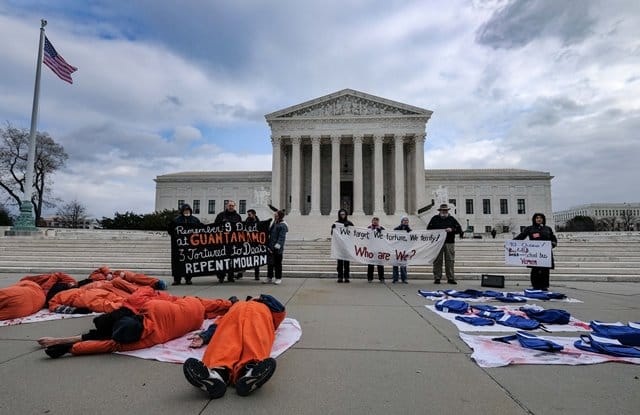
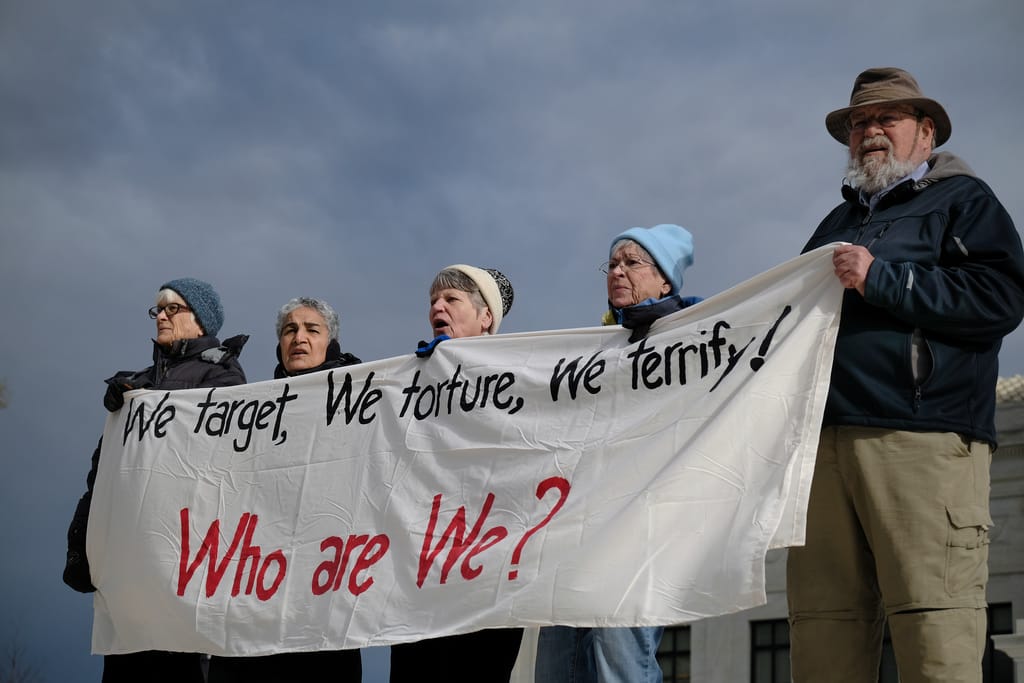
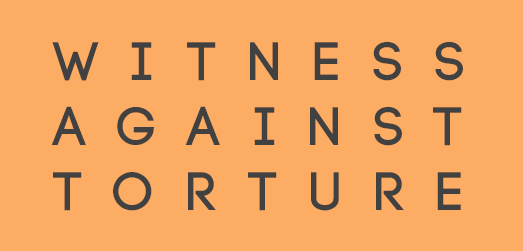

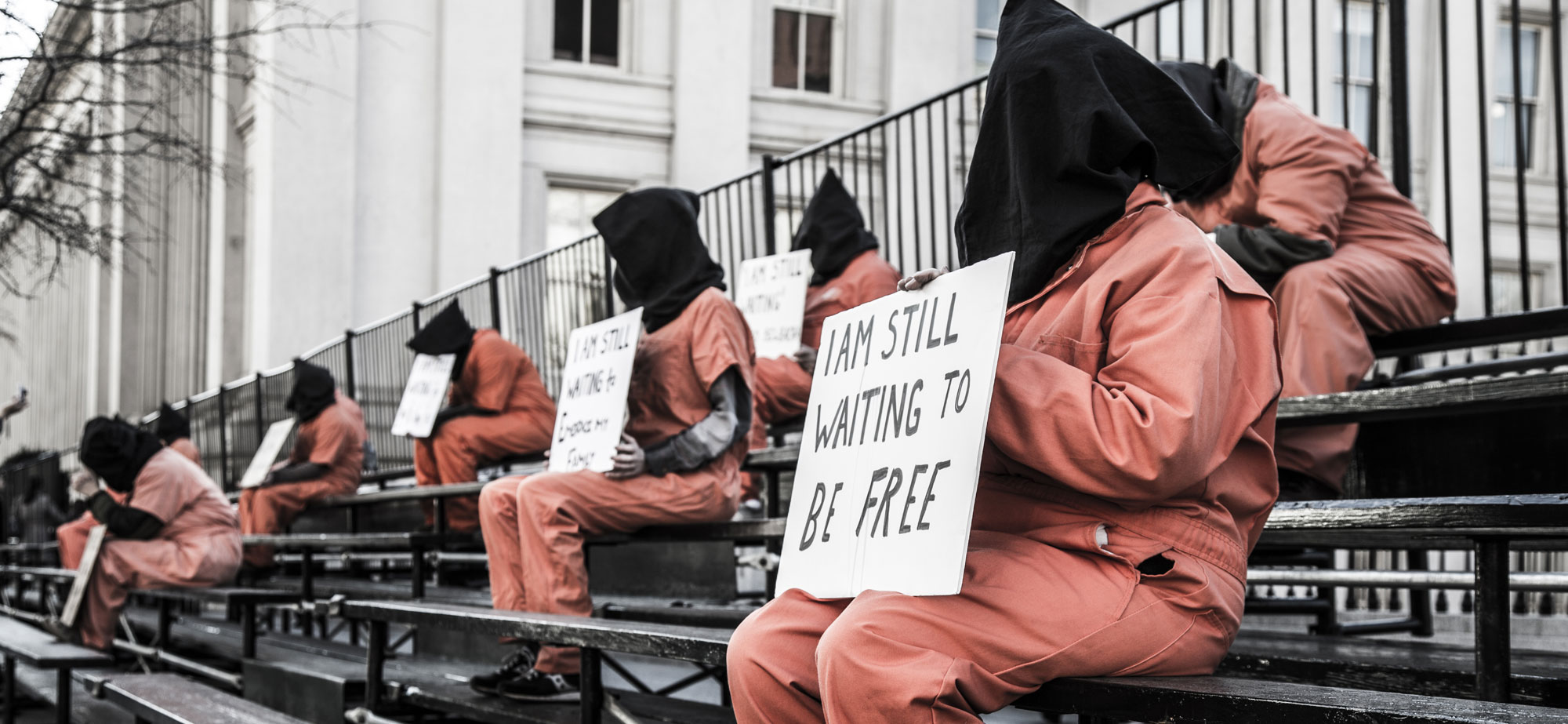
Join us on social media